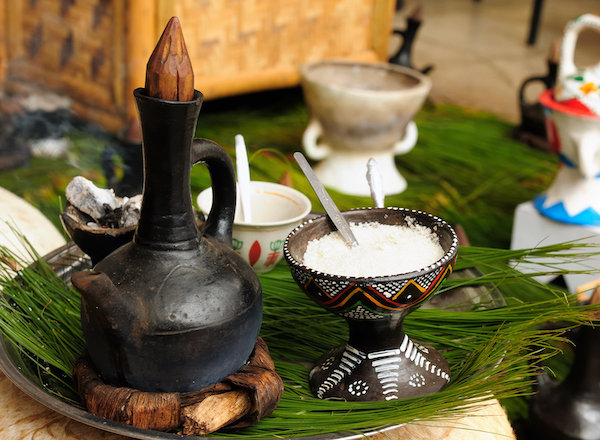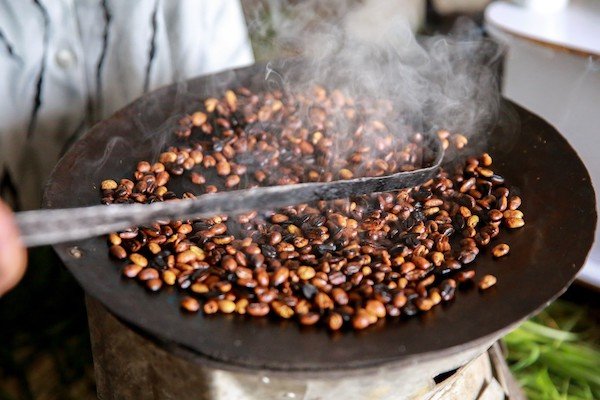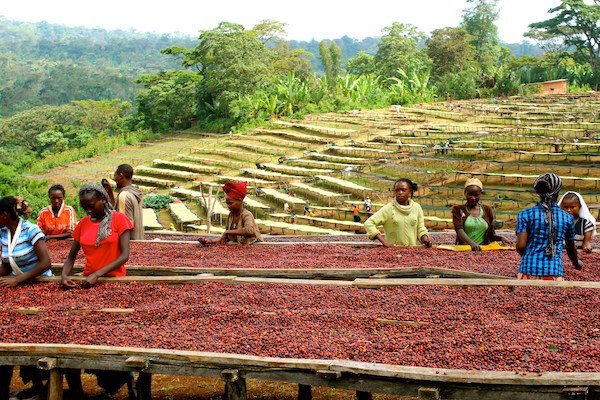You can refuse to attend the wedding, but you must not miss the coffee ceremony.
Professional coffee knowledge exchange more coffee bean information please follow the coffee workshop (Wechat official account cafe_style)

、
There is a proverb in Ethiopia: "you can refuse to attend the wedding, but you must not miss the coffee ceremony." When the locals invite you to their coffee ceremony, it shows that they have accepted and recognized you, and if you refuse to attend, it is regarded as a very impolite behavior and does not identify with their culture.
The birthplace of coffee in the world:
Ethiopia is the birthplace of coffee in the world. Some friends may question this saying. They think that Ethiopian coffee is not as famous as Brazilian coffee or Colombian coffee. How can it be regarded as the birthplace? In fact, according to statistics, only about 40% of Ethiopia's annual coffee is exported, which is much lower than that of countries such as Brazil and Colombia.
So the question is, why does Ethiopia have a small proportion of coffee exports? That's because coffee is used more in various rituals in the local area. For example, at local weddings, organizers cook a porridge made of coffee beans, coffee jam, butter and salt, which is one of the processes that Ethiopian weddings must take place.

A long coffee ceremony:
Of course, the coffee beans used for weddings are only a small part, and more coffee beans are used in the long local coffee ceremony. The purpose of the ceremony is very diverse, not limited to prayers or blessings, it may be a marriage proposal, more likely to mean the resolution of a family conflict, the average length of each coffee ceremony is 1.5 hours. And all this must have a premise, that is, the coffee beans must be roasted in advance, and then a graceful girl will pour them into the pot, so that everyone present must smell the wonderful fragrance of coffee beans.

Ethiopians manage the first cup of coffee called "Abol". You may not expect that this freshly cooked "Abol" is the worst, but also the most important, which directly affects the outcome of the ceremony. Therefore, the parties must drink this cup of "Abol" forcefully, and be "solemn and stirring" with a smile even if they are very sad. In addition, they must be clear and concise to express their views so as to win support for themselves.
The second cup of coffee is called "Tona". It is boiled again with water after the first cup of coffee is brewed, and its taste is still very exciting. Whether the mediation of the coffee ceremony can achieve the ideal goal depends on the performance of the second cup of coffee. If the other person does not hesitate to drink this cup of "Tona", then congratulations, indicating that he has accepted your point of view, and there is a delightful third cup of coffee between you. But each other's mind is rock solid, motionless, then you no longer have a second cup of coffee, ready to "war" it!
Finally, when the dispute reaches a perfect consensus, then you will have a third cup of "Baraka" symbolizing joy, which is very mellow and full-bodied, which can be said to be the essence of the whole pot of coffee.
The ancient process of tanning:
There are also three famous coffee producing areas in Ethiopia, namely Yiragcheffe, Harald and Sidamo, and Yejasuffe has become synonymous with local coffee. Unlike other countries, Ethiopians do not seem to be keen on picking fruit from coffee trees, but prefer to collect ripe and fallen fruit under coffee trees, although this has somewhat damaged the quality of coffee. However, they rarely use water washing in the way they deal with coffee beans, but use the ancient sun method to make up for their own shortcomings, so that coffee beans can better absorb the aroma of the flesh.

It is worth mentioning that the utensils used by Ethiopians to make coffee are also very strange. This is a special clay pot. Before brewing coffee, heat the pottery pot with coal, and the owner should remove the parchment-like endocarp and silver skin from the surface of the washed coffee beans. Add a little rosin to the fire, then take out an iron pan shaped like a pan, put it on the fire, pour in the washed coffee beans, and stir constantly with a shovel. When the coffee beans gradually turn light brown, you will hear the crackling sound like firecrackers. At this time, we call it "first explosion"? after the baptism of "first explosion", you don't have to wait too long to hear the sound of "second explosion", and the coffee beans will turn dark brown. At this time, prepare the tools to grind the coffee beans into powder, pour them into a warm clay pot, and add spices such as cardamom and cinnamon, or add a kind of vanilla called Adam's Health to boil together. is the most authentic way to drink Ethiopian coffee.
When we Chinese describe the wine as attractive, we have the saying that we can get off the horse by smelling incense, and authentic Ethiopian coffee also has a reputation of getting drunk before drinking, which shows how irresistible its allure is.
Important Notice :
前街咖啡 FrontStreet Coffee has moved to new addredd:
FrontStreet Coffee Address: 315,Donghua East Road,GuangZhou
Tel:020 38364473
- Prev

Huixoc Farm of Vivette Nanguo, Guatemala? how's the coffee taste of Huixoc Farm?
Professional coffee knowledge exchange more coffee bean information please follow the coffee workshop (Wechat official account cafe_style) when you think of Guatemalan coffee what Antigua comes to mind first? Is this the name of the ancient capital, the god of flowers? This is the name of a brand, and the meticulous smell of smoke is correct. This is the characteristic of Guatemalan coffee, which is mainly caused by volcanic geology.
- Next

The birth of Pacamara and its characteristics how is the flavor of Pacamara
For more information on coffee beans, please follow the Coffee Workshop (Wechat official account cafe_style) Pacamara, a new hybrid born in El Salvador in 1958, but it was not until the 21st century that it was grown slightly more. When Robin filmed a coffee documentary in Melbourne in 2014, it was still a legendary rare bean species, and many people only knew its name but never tasted it.
Related
- Does Rose Summer choose Blue, Green or Red? Detailed explanation of Rose Summer Coffee plots and Classification in Panamanian Jade Manor
- What is the difference between the origin, producing area, processing plant, cooperative and manor of coffee beans?
- How fine does the espresso powder fit? how to grind the espresso?
- Sca coffee roasting degree color card coffee roasting degree 8 roasting color values what do you mean?
- The practice of lattes: how to make lattes at home
- Introduction to Indonesian Fine Coffee beans-- Java Coffee producing area of Indonesian Arabica Coffee
- How much will the flavor of light and medium roasted rose summer be expressed? What baking level is rose summer suitable for?
- Introduction to the characteristics of washing, sun-drying or wet-planing coffee commonly used in Mantenin, Indonesia
- Price characteristics of Arabica Coffee Bean Starbucks introduction to Manning Coffee Bean Taste producing area Variety Manor
- What is the authentic Yega flavor? What are the flavor characteristics of the really excellent Yejasuffi coffee beans?

